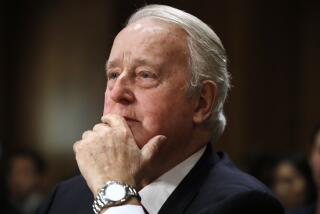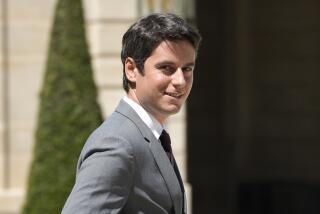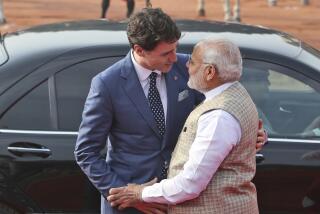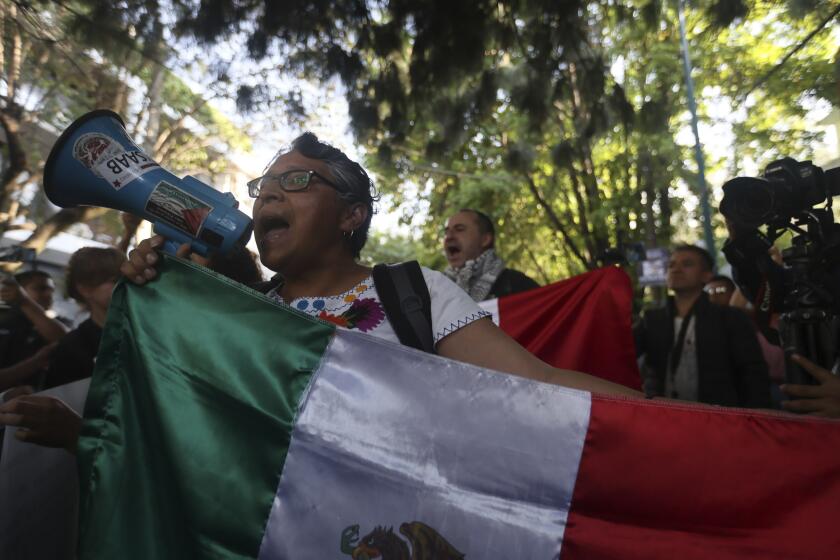Canada’s Justin Trudeau proves he’s more than just the son of Pierre Trudeau
Nobody expected Justin Trudeau to win when he entered the boxing ring three years ago to duke it out with one of Canada’s Conservative senators in a charity match.
Trudeau’s competitor, Patrick “Brass Knuckles” Brazeau, had fought more matches in a month than Trudeau, a Liberal senator, had in his privileged life, one skeptical announcer said as the fight began.
------------
FOR THE RECORD: In the Oct. 21 Section A, an article about newly elected Canadian Prime Minister Justin Trudeau referred to him as a former senator. He was a member of the House of Commons, not the Senate.
------------
A few minutes later, though, it was Trudeau’s arm that was thrust into the sky, and not even Brass Knuckles could argue with the outcome. “I’m giving the man credit. He beat me,” the breathless Brazeau said.
Trudeau had defied all expectations, proving that he was more than just the son of Canada’s charismatic former prime minister, Pierre Trudeau.
He has done it again with his stunning upset over Conservative Prime Minister Stephen Harper’s party, defying polls, pundits and skeptics who just a few months ago saw the 43-year-old with the youthful looks and lovely family as having little chance of ending the decade-long Conservative hold on Parliament.
Trudeau’s Liberals on Monday won 39.5% of the overall vote and 184 out of 338 seats in Parliament, a large enough majority to enable him to govern without relying on other parties. Trudeau has vowed to raise taxes on the rich, boost government spending on infrastructure and other projects, step up efforts to reduce carbon emissions, and embrace Canada’s ethnic diversity.
His unabashedly liberal views — Trudeau supports abortion rights and favors legalizing recreational marijuana use — struck a chord with Canadians, who, according to polls, had grown weary of the Harper government’s harsh rhetoric. No issue during the campaign exemplified this as much as the debate over the Conservatives’ support for a ban on the wearing of niqabs, or full face veils, by devout Muslim women taking the oath of citizenship.
Trudeau’s opponents said his all-inclusive attitude toward immigrants, as well as his plan to end Canada’s military involvement in the fight against Islamic State militants overseas, showed him to be soft on terrorism. Trudeau painted his opponents as dangerous xenophobes who would take Canada back to the 1930s, when it turned away thousands of Jews fleeing Europe during World War II.
“My friends, we beat fear with hope,” Trudeau said as he declared victory Tuesday in Montreal and supporters chanted his name. “We beat negative, divisive politics with a positive vision that brings Canadians together.”
For many pundits, the turning point in Trudeau’s campaign came Aug. 6 during a televised debate with his opponents. Until that point, the Conservatives’ campaign mantra had been that Trudeau was “just not ready.”
Harper’s spokesman famously said before the debate that expectations for Trudeau were so low that if he managed to come onstage with his pants on, it would be an accomplishment.
That strategy of bashing Trudeau actually made it easier for the Liberal to shine, says Jonathan Malloy, chairman of the political science department at Carleton University in Ottawa, the capital.
“They lowered expectations so much, it was easy for him to beat them. He was very credible. He didn’t say anything strange,” Malloy said in a telephone interview. “In retrospect, that was a terrible strategy by the Conservatives. They just let him build and build.”
Just like the 2012 boxing match, it was another example of Trudeau rising above the expectations that many had of the handsome son of Pierre Trudeau and his glamorous, much younger wife, Margaret, whose dislike for life in the prime minister’s residence when Justin was a boy became tabloid fodder.
Justin Trudeau showed no obvious signs of wanting to follow his father into the halls of power. He was an avid snowboarder in the 1990s and is remembered by one former snowboarding pal, Sean Smillie, for driving “an exceptionally crappy car” to the slopes and frequently crashing on his friend’s sofa.
“I’d have to hop out at intersections and push the car so it wouldn’t die. It was always a miracle we made it to where we were going,” Smillie told CBC Radio.
Trudeau went on to become a teacher in Vancouver. He was elected to Parliament in 2008 when he was 36 .
“It’s fair to say before that, he didn’t have a lot of life accomplishments,” said Malloy, explaining the skepticism surrounding Trudeau’s recent campaign. “He kind of drifted. He didn’t have any kind of particular career, except he was Justin Trudeau. Frankly, he had a reputation of being a rich, young dilettante.”
But Trudeau had shined in the past. Canadians old enough to remember the hold his late father had on the country still recall how Trudeau brought tears to the eyes of millions when he delivered the final, passionate words at his father’s funeral in 2000.
In his eulogy, Trudeau, then 28, urged fellow Canadians to live up to the ideals his father had for their country. “He won’t be coming back anymore. It’s all up to us, all of us, now,” Trudeau said.
It would be years before he formally entered politics, but there is one person who never doubted Trudeau’s leadership abilities: his mother, Margaret, who gave birth to Justin on Christmas Day 1971. He was the eldest of the three sons she had with Pierre Trudeau.
In an interview on Canada’s CTV network after Justin Trudeau’s election victory, Margaret Trudeau said she always knew her son was born to lead. “He always won, whatever he took on,” said Margaret Trudeau, who was 22 when she married the 51-year-old prime minister in 1971. The couple, who had met when she was 18, divorced in 1984.
In the interview, Margaret Trudeau joked that she was the one who would let the boys devour pizza and video games. Their father was the one pushing them to read the classics and study. She referred to 24 Sussex, the prime minister’s residence, as the “crown jewel of the federal penitentiaries” and said she worried about the pressure her son and his family will face as they move into the home she once dreaded.
“But Justin can take it,” she said.
Her son, no doubt, agrees.
After that upset in the 2012 boxing match, Justin Trudeau acknowledged he’d taken a few tough blows in the opening seconds.
“But I kept going,” he said, comments that could also apply to his campaign victory. “I can take a hard hit. And he didn’t realize that.”
Now that he is in the position his father once held, the question is whether Justin Trudeau can live up to the legend of Pierre Trudeau and of other political leaders who have swept to victory on promises of massive change.
Critics have warned that Trudeau’s economic policies, in particular, will devastate Canada.
“He remains one of the least qualified people to be seriously considered for the role of head of government in the modern history of the Westminster parliamentary system,” the National Post newspaper wrote in an editorial this week that urged voters to cast ballots for the Conservatives.
“I fear debt. Mountains of it,” Toronto Sun columnist Christina Blizzard wrote after the Liberals’ victory. “Voters, for some inexplicable reason, have given them license to turn Canada into Greece North,” she wrote, a reference to the long-running Greek financial mess.
Malloy says Trudeau faces extraordinarily high expectations and will need smart advisors to help him make decisions.
But the pressure will be tempered by the Canadian political system, which ensures the party, not just the prime minister, will call the shots. And he’ll be helped by the natural charisma that appealed to voters this week, as it did decades ago when his father won election.
“Pierre Trudeau was a remarkably compelling individual,” Malloy said of Canada’s 15th prime minister, first elected in 1968. “It’s very clear his son has inherited that.”
More to Read
Start your day right
Sign up for Essential California for news, features and recommendations from the L.A. Times and beyond in your inbox six days a week.
You may occasionally receive promotional content from the Los Angeles Times.







